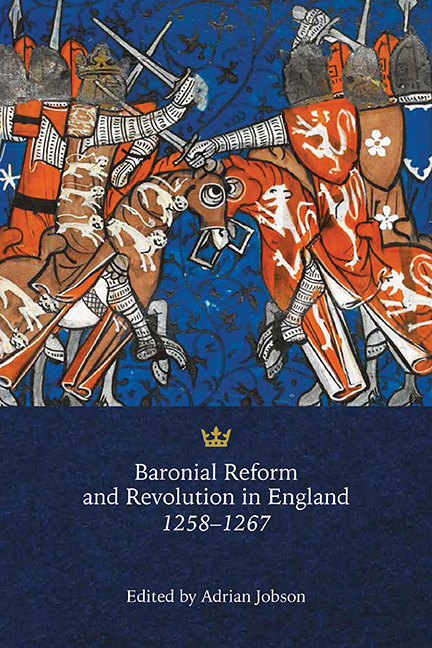Book contents
- Frontmatter
- Dedication
- Contents
- List of Illustrations
- Acknowledgements
- List of Abbreviations
- Introduction
- Modern Historians and the Period of Reform and Rebellion, 1258–1265
- The Secret Revolution of 1258
- Baronial Reform, the Justiciar’s Court and Commercial Legislation: The Case of Grimsby
- Crisis Management: Baronial Reform at the Exchequer
- Local Administration during the Period of Reform and Rebellion
- What Happened in 1261?
- Writing Reform and Rebellion
- Civic Government in Troubled Times: London c.1263–1270
- The Montfortian Bishops
- Reformers and Royalists: Aristocratic Women in Politics, 1258–1267
- The Midlands Knights and the Barons’ War: The Warwickshire Evidence
- Retinues, Agents and Garrisons during the Barons’ Wars
- The Barons’ War in the North of England, 1264–1265
- The Maritime Theatre, 1258–1267
- Reasserting Medieval Kingship: King Henry III and the Dictum of Kenilworth
- Index
Reasserting Medieval Kingship: King Henry III and the Dictum of Kenilworth
Published online by Cambridge University Press: 21 May 2021
- Frontmatter
- Dedication
- Contents
- List of Illustrations
- Acknowledgements
- List of Abbreviations
- Introduction
- Modern Historians and the Period of Reform and Rebellion, 1258–1265
- The Secret Revolution of 1258
- Baronial Reform, the Justiciar’s Court and Commercial Legislation: The Case of Grimsby
- Crisis Management: Baronial Reform at the Exchequer
- Local Administration during the Period of Reform and Rebellion
- What Happened in 1261?
- Writing Reform and Rebellion
- Civic Government in Troubled Times: London c.1263–1270
- The Montfortian Bishops
- Reformers and Royalists: Aristocratic Women in Politics, 1258–1267
- The Midlands Knights and the Barons’ War: The Warwickshire Evidence
- Retinues, Agents and Garrisons during the Barons’ Wars
- The Barons’ War in the North of England, 1264–1265
- The Maritime Theatre, 1258–1267
- Reasserting Medieval Kingship: King Henry III and the Dictum of Kenilworth
- Index
Summary
This essay examines the Dictum of Kenilworth with the intention of shedding further light on Henry III's political ideas and on his use of ceremonial and rhetoric. In simplest terms, the Dictum was a peace settlement. Issued on 31 October 1266, it sought to end the longest siege in English history by establishing a procedure by which people dispossessed by the king after the battle of Evesham (4 August 1265) could reclaim their lands. The Dictum of Kenilworth is a complex document and can be analysed in different ways. The approach adopted here is more biographical than bibliographical, because the language and tenor of the Dictum suggest that Henry III influenced it. The king vacillated between revenge and reconciliation throughout the 1260s as he sought to restore peace and punish those who had defied him. Henry's contradictory positions gave rise to actions that concerned his subjects. This explains why Kenilworth Castle did not easily surrender and why a diplomatic route, in the form of the Dictum, had to be pursued. Passages within the Dictum reflect Henry's frame of mind, and this probably explains its initial rejection by the Kenilworth garrison. Discussions between the king and his subjects, which ultimately made the Dictum of Kenilworth's terms acceptable, reveal much about developing political ideas in thirteenth-century England. More generally, then, this essay contributes to recent discussions concerning the effects of changes in the ways kings governed in high medieval western and central Europe.
The causes and consequences of the rise of administrative kingship have long preoccupied historians, with good reason. The enlargement and increasing professionalism of royal bureaucracies, combined with the development of written records, provided rulers with systematic and sustained methods of harnessing their kingdom's resources. The omnipresence of royal administration had various consequences. One of the most significant was the enhanced provision of understanding of the workings of politics and law for a larger number of the ruler's subjects, literate and non-literate alike. The ‘routinization’ of kingship, as some historians have termed the expansion of royal administration, turned out to be a double-edged sword. On the one hand, rulers gained greater knowledge of their kingdom's wealth and new ways to exploit it, but on the other hand, the encroachment of royal institutions and officials created a more litigious, demanding and often critical public, whom the ruler was increasingly obliged to satisfy by confirming or making royal concessions.
- Type
- Chapter
- Information
- Baronial Reform and Revolution in England, 1258-1267 , pp. 237 - 258Publisher: Boydell & BrewerPrint publication year: 2016



